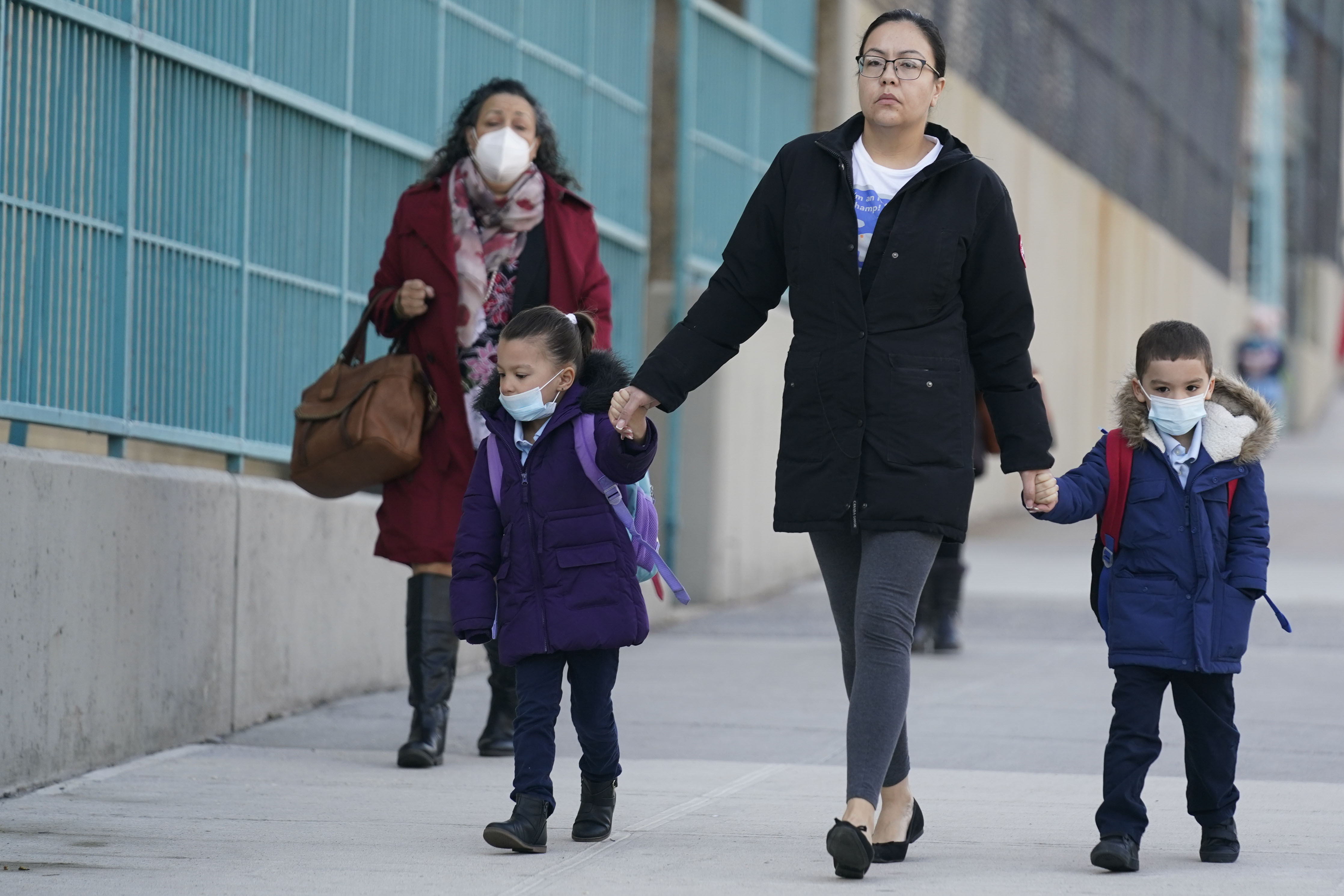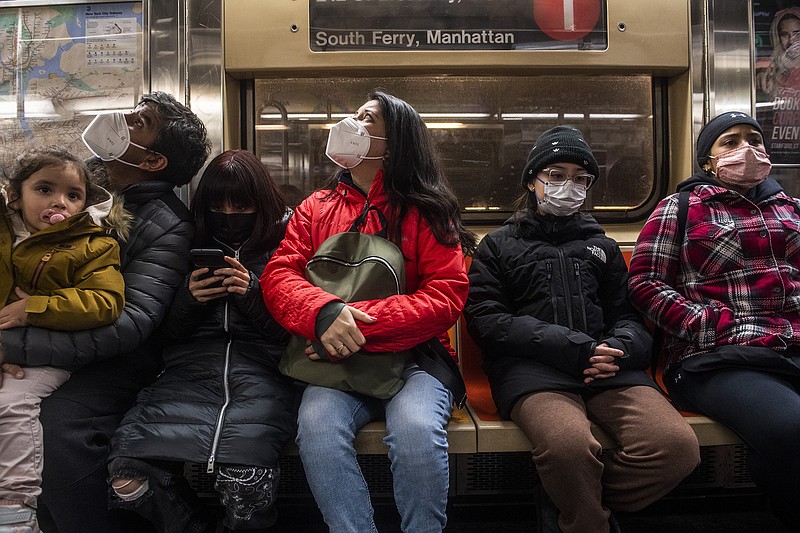WASHINGTON -- The Biden administration announced Wednesday that it is extending the nationwide mask requirement for airplanes and public transit for 15 days as it monitors an uptick in covid-19 cases.
The Centers for Disease Control and Prevention said it was extending the order, which was set to expire on April 18, until May 3 to allow more time to study the BA.2 omicron subvariant that is now responsible for the vast majority of cases in the U.S.
"In order to assess the potential impact the rise of cases has on severe disease, including hospitalizations and deaths, and health care system capacity, the CDC order will remain in place at this time," the agency said.
When the Transportation Security Administration, which enforces the rule for planes, buses, trains and transit hubs, extended the requirement last month, it said the CDC had been hoping to roll out a more flexible masking strategy that would have replaced the nationwide requirement.
The mask mandate is the most visible vestige of government restrictions to control the pandemic, and possibly the most controversial. A surge of abusive and sometimes violent incidents on airplanes has been attributed mostly to disputes over mask-wearing.
Airlines have lobbied for months to kill the requirement, arguing that effective air filters on modern planes make transmission of the virus during a flight highly unlikely. Republicans in Congress also fought to kill the mandate.
Critics have seized on the fact that states have rolled back rules requiring masks in restaurants, stores and other indoor settings, and yet covid-19 cases have fallen sharply since the omicron variant peaked in mid-January.
"It is very difficult to understand why masks are still required on airplanes, but not needed in crowded bars and restaurants; in packed sports arenas; in schools full of children; or at large indoor political gatherings," Nicholas Calio, the CEO of industry trade group Airlines for America, said Wednesday in a letter to the heads of the CDC and the Health and Human Services Department. "Simply put, an extension of the mask mandate does not make sense."
CASE INCREASE
There has been a slight increase in cases in recent weeks, with daily confirmed cases nationwide rising from about 25,000 per day to more than 30,000. More than 85% of those cases are the highly contagious BA.2 strain.
Severe illnesses and deaths tend to lag infections by several weeks. The CDC is awaiting indications of whether the increase in cases correlates to a rise in adverse outcomes before announcing a less restrictive mask policy for travel.
A poll in mid-March by the Kaiser Family Foundation found that Americans are evenly divided over keeping the mask rule for transportation.
The poll found that 51% wanted the mandate to expire and 48% said it should remain in place -- in effect, a tie, given the poll's margin of error. Democrats overwhelmingly supported the rule, and Republicans were even more united in opposing it. Vaccinated people and those with chronic health conditions favored keeping the rule, but by smaller margins.
Airlines imposed their own mask mandates in 2020, when the Trump administration declined to take action. Unions representing flight attendants, which once backed mask rules, now decline to take a position because their members are divided over the issue.
Ed Bastian, the CEO of Delta Air Lines, said that some people might start flying if they don't have to wear a mask, and others might stop flying if other passengers are unmasked. He called both groups "fringe," and he predicted that many people will continue to wear masks even if the rule is dropped.
MILESTONES FALL
Meanwhile, the coronavirus is continuing to stalk the world at an astonishing clip, racing past a grim succession of pandemic milestones in 2022: totals of 300 million known cases around the world by early January, 400 million by early February and, as of Tuesday, half a billion.
There have almost certainly been far more infections than that among the global population of 7.9 billion, with many going undetected or unreported, and the reporting gap may only grow wider as some countries, including the United States, scale back official testing.
"That's dangerous," Ali Mokdad, an epidemiologist at the University of Washington, and formerly of the Centers for Disease Control and Prevention, said recently. "If you don't test, then you don't know what variants you have."
Regional officials with the World Health Organization recently urged African countries to ramp up testing and contact tracing, and called for some countries in the Americas to double down on efforts to increase vaccination and testing as cases remained higher in Europe. A WHO analysis also recently estimated that 65% of Africans had been infected with the coronavirus as of September 2021, nearly 100 times the number of confirmed cases on the continent.
Over the course of the pandemic, countries with limited public health resources may have detected and confirmed only a tiny fraction of the cases in their populations. And more recent figures may miss many at-home rapid test results that are never officially reported. Many people with infections are never tested at all, because they have no symptoms, or lack access to testing, or want to avoid the consequences of a positive test result, or choose not to for other reasons.
Coronavirus deaths have also been declining.
Still, the director-general of the WHO, Dr. Tedros Adhanom Ghebreyesus, recently said that the world remains in the acute phase of the pandemic, and many health experts agree.
Experts' warnings have not stopped many nations from dropping their pandemic precautions almost completely in the two months since the global case count surpassed 400 million. In the United States, the Centers for Disease Control and Prevention issued new guidelines in late February suggesting that most Americans could stop wearing masks, and no longer needed to maintain social distance or avoid crowded indoor spaces.
"What's happening globally and in the U.S.," Mokdad said, "is that people basically gave up. They just want to go back to normal life."
The peak of the most recent surge may have passed in some parts of Europe, but Hong Kong is still trying to escape an outbreak that began in January, and Shanghai residents are under lockdown and reporting food shortages.
"The focus on new cases is warranted," Crystal Watson, a senior scholar at the Johns Hopkins Center for Health Security, said recently. "What we're seeing in China is a very extreme surge in cases, because they have not had a lot of exposure there, and the vaccine is less effective there."
More than 5.1 billion people -- about 66.4% of the world population -- have received at least one dose of a coronavirus vaccine, according to the Our World in Data project at the University of Oxford. More than 1.7 billion booster shots or additional doses have been administered globally. But coverage varies starkly among regions. Africa's rates are the lowest of any continent, with about 20% of people having received at least one dose.
MUTATION WATCH
WHO said it was monitoring several mutants of the virus descended from the omicron variant, including some recombined forms of existing omicron subvariants.
The health organization said scientists in Botswana and South Africa have detected new forms of the omicron variant, labeled as BA.4 and BA.5, but aren't sure yet if they might be more transmissible or dangerous.
To date, the new versions of omicron have been detected in four people in Botswana and 23 people in South Africa. Beyond Africa, scientists have confirmed cases in Belgium, Denmark, Germany and the United Kingdom.
WHO said there was so far no evidence the new sub-variants spread any differently than the original omicron variant.
"There is no cause for alarm with the emergence of the new sub-variants," Dr. Matshidiso Moeti, WHO's Africa director, said in a statement. "We are not yet observing a major spike in cases, hospitalizations or deaths."
The agency called on all countries to sequence at least 5% of their covid-19 samples.
Meanwhile, the number of new coronavirus cases and deaths reported to WHO fell for a third consecutive week, a trend likely helped by the dismantling of testing and surveillance programs.
In its latest weekly report on the pandemic, issued late Tuesday, the U.N. health agency said the more than 7 million new cases reported represented a 24% decline from a week earlier. The weekly worldwide number of covid-19 deaths, was down 18%, at over 22,000.
WHO said the decreases "should be interpreted with caution" as numerous countries where the virus is starting to subside have changed their testing strategies.
New cases and deaths are falling in every region of the world.
Information for this article was contributed by Zeke Miller, David Koenig, Mike Stobbe and staff members of The Associated Press and Adeel Hassan of The New York Times.
 FILE - Children and their caregivers arrive for school in New York, Monday, March 7, 2022. The Biden administration will extend for two weeks the nationwide mask requirement for public transit as it monitors an uptick in COVID-19 cases. The Centers for Disease Control and Prevention was set to extend the order, which was to expire on April 18, by two weeks to monitor for any observable increase in severe virus outcomes as cases rise in parts of the country. (AP Photo/Seth Wenig, File)
FILE - Children and their caregivers arrive for school in New York, Monday, March 7, 2022. The Biden administration will extend for two weeks the nationwide mask requirement for public transit as it monitors an uptick in COVID-19 cases. The Centers for Disease Control and Prevention was set to extend the order, which was to expire on April 18, by two weeks to monitor for any observable increase in severe virus outcomes as cases rise in parts of the country. (AP Photo/Seth Wenig, File)